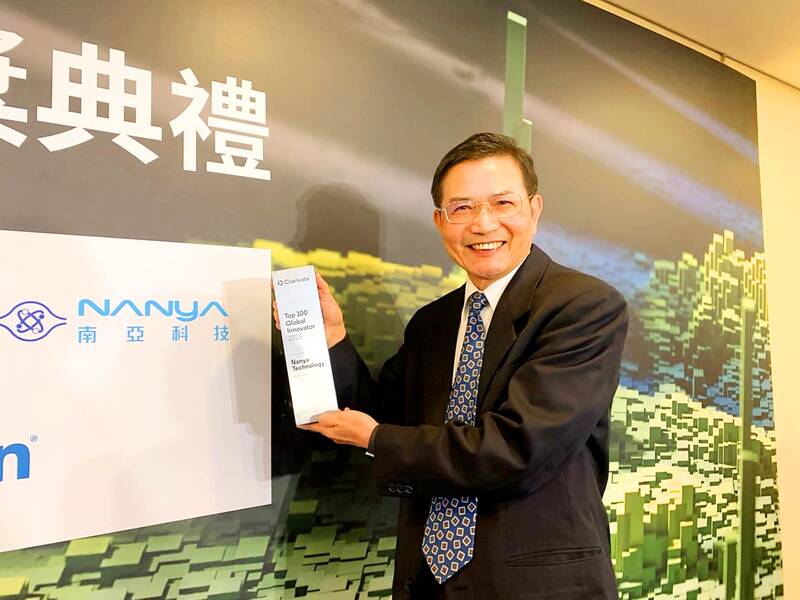DRAM chipmaker Nanya Technology Corp (南亞科技) yesterday reported a widening quarterly loss of NT$1.69 billion (US$55.5 million) for last quarter as lower chip prices and idled equipment depreciation costs drove gross margin into negative territory for the first time in about a decade.
That was compared with a loss of NT$1.15 billion in the fourth quarter last year. The New Taipei City-based chipmaker reported net profit of NT$6.55 billion during the first quarter of last year.
Average selling prices and shipments fell at high-single-digit percentages last quarter on a quarterly basis, as demand weakened for all applications from mobile phones, computers and servers, to consumer electronics.

Photo: Grace Hung, Taipei Times
People have been unwilling to spend on lavish electronics, while businesses have tightened capital budgets amid a weak world economy, geopolitical turmoil in Europe, high inflation, and recent bank crises in the US and Europe, the chipmaker said.
Nanya Technology lowered output by about 20 percent to cope with the weakness.
Gross margin sank to minus 8.6 percent last quarter, from 13 percent in the previous quarter and 43.9 percent in the first quarter of last year, the company said in a statement.
“If the company did not cut output, gross margin would have been in the positive territory,” Nanya Technology president Lee Pei-ing (李培瑛) told a virtual media briefing.
Idled equipment costs led to an increase in unit costs, as shipments dropped, the company said.
As demand remains weak, Nanya Technology plans to extend the 20 percent reduction rate into this quarter.
The company expects average selling prices to fall slightly this quarter as the world’s major memorychip makers are likely to work through excess inventory as a result of output reductions.
Samsung Electronics Co’s announcement on Friday that it would lower production to a “meaningful level,” helped boost Nanya Technology’s stock price, which rallied 2.25 percent to NT$68.2 yesterday.
“There is the possibility that pricing would bottom out this quarter,” Lee said, adding that he still maintains that DRAM prices would stabilize in the third quarter.
An improvement in supply-and-demand dynamics might help bring back Nanya Technology’s gross margin into positive territory late this quarter or next quarter, he said, adding that the company expects to have a clearer picture in the next one to two months.
Overall, output adjustments by DRAM suppliers in the first half of this year along with seasonal demand might help reduce inventories and contribute to marginal DRAM market recovery in the second half, he said.
The penetration of artificial intelligence and 5G-related technology might help improve server DRAM demand, while mobile DRAM might pick up in the second half of this year, benefiting from seasonal demand related to smartphone shipments, particularly in China, he said.
PC DRAM demand might increase mostly due to lower inventory and increases in average DRAM content in computers, he said.
DRAM used in consumer electronics might recover in the second half as demand for Internet protocol cameras, networking devices, and industrial and automotive applications remain relatively healthy, he said.

RUN IT BACK: A succesful first project working with hyperscalers to design chips encouraged MediaTek to start a second project, aiming to hit stride in 2028 MediaTek Inc (聯發科), the world’s biggest smartphone chip supplier, yesterday said it is engaging a second hyperscaler to help design artificial intelligence (AI) accelerators used in data centers following a similar project expected to generate revenue streams soon. The first AI accelerator project is to bring in US$1 billion revenue next year and several billion US dollars more in 2027, MediaTek chief executive officer Rick Tsai (蔡力行) told a virtual investor conference yesterday. The second AI accelerator project is expected to contribute to revenue beginning in 2028, Tsai said. MediaTek yesterday raised its revenue forecast for the global AI accelerator used

TEMPORARY TRUCE: China has made concessions to ease rare earth trade controls, among others, while Washington holds fire on a 100% tariff on all Chinese goods China is effectively suspending implementation of additional export controls on rare earth metals and terminating investigations targeting US companies in the semiconductor supply chain, the White House announced. The White House on Saturday issued a fact sheet outlining some details of the trade pact agreed to earlier in the week by US President Donald Trump and Chinese President Xi Jinping (習近平) that aimed to ease tensions between the world’s two largest economies. Under the deal, China is to issue general licenses valid for exports of rare earths, gallium, germanium, antimony and graphite “for the benefit of US end users and their suppliers

Dutch chipmaker Nexperia BV’s China unit yesterday said that it had established sufficient inventories of finished goods and works-in-progress, and that its supply chain remained secure and stable after its parent halted wafer supplies. The Dutch company suspended supplies of wafers to its Chinese assembly plant a week ago, calling it “a direct consequence of the local management’s recent failure to comply with the agreed contractual payment terms,” Reuters reported on Friday last week. Its China unit called Nexperia’s suspension “unilateral” and “extremely irresponsible,” adding that the Dutch parent’s claim about contractual payment was “misleading and highly deceptive,” according to a statement

Artificial intelligence (AI) giant Nvidia Corp’s most advanced chips would be reserved for US companies and kept out of China and other countries, US President Donald Trump said. During an interview that aired on Sunday on CBS’ 60 Minutes program and in comments to reporters aboard Air Force One, Trump said only US customers should have access to the top-end Blackwell chips offered by Nvidia, the world’s most valuable company by market capitalization. “The most advanced, we will not let anybody have them other than the United States,” he told CBS, echoing remarks made earlier to reporters as he returned to Washington